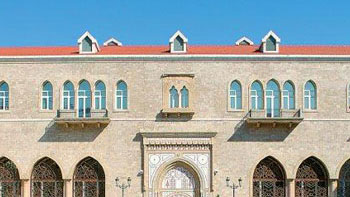Top Ministries and Public Institutions in Lebanon
There are 22 different ministries in Lebanon.
Marcopolis.net presents a list of top ministries and public institutions in Lebanon.

Top Ministries and Public Institutions in Lebanon
There are 22 different ministries in Lebanon.
Marcopolis.net presents a list of top ministries and public institutions in Lebanon.
According to the latest statistics released by the Central Administration of Statistics, 176,000 persons were employed in the Lebanese public sector in 2007. Lebanon is considered a free market economy with the dominant role of the private sector. Public sector expenditures represent 19% of the Lebanese GDP.
The government accumulated significant debt which – according to Saad Azhari from Blom Bank – had already decreased from 180% to 130% of GDP or lower, thus reaching around US$ 50 billion.
Top Ministries in Lebanon
 Prime Minister of Lebanon
Prime Minister of Lebanon
 Ministry of Finance
Ministry of Finance
 Ministry of Economy and Trade
Ministry of Economy and Trade
 Ministry of Post & Telecommunications
Ministry of Post & Telecommunications
 Ministry of Tourism
Ministry of Tourism
 Ministry of Industry
Ministry of Industry
Top Public Sector Institutions in Lebanon
 Investment Development Authority of Lebanon (IDAL)
Investment Development Authority of Lebanon (IDAL)
Nabil Itani | Chairman – General Manager
Since its establishment in1994 by virtue of Decree no. 5778 the Investment Development Authority of Lebanon (IDAL) has been aiming to increase and maintain the flow of Foreign Direct Investment (FDI) into Lebanon, and support and speed up the process of cutting red tape and elimination of bureaucratic procedures.
IDAL’s goal is to promote and help investments coming to Lebanon and support export of specific industries. IDAL offers services to all investors who are deciding whether and how to invest in Lebanon.
 Higher Council for Privatization (HCP)
Higher Council for Privatization (HCP)
Ziad Hayek | Secretary General
The aim of Higher Council for Privatization is to assist Lebanon in reaping the benefits of privatization through professional planning, initiation and implementation of privatization programs.
HCP also seeks to increase the efficiency and productivity of state-controlled sectors, encourage the private ownership by Lebanese citizens, attract new flows of foreign direct investment into Lebanon, decrease the public debt, expand the domestic capital markets, push for further economic growth of Lebanon, and promote true partnerships between the public and private sectors.